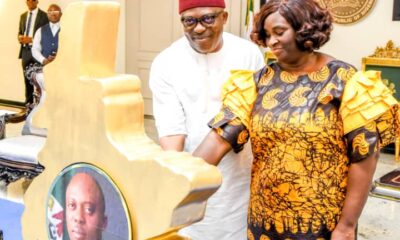Business
MAN Spends 40% Of Cost On Energy
Manufacturers Association of Nigeria (MAN) has said its members are currently spending between 35 per cent to 40 per cent of total costs of production on energy needs.
President, MAN, Francis Meshioye, disclosed this during an interview with newsmen.
According to him, any increase in energy costs such as electricity tariff or fuel price hike increases their cost.
Meshioye said, “We rejected the hike in electricity tariff because, in the first instance, energy cost is very high for manufacturers, particularly those who consume much like steel manufacturers.
“It takes an average of 35 to 40 per cent of their total costs. Any increase in electricity tariff makes it harder on us. The harder it is, the harder it will be for consumers. When this is so, it means that the demand for products will drop. Like I said in my previous interview, the profit margin will be low.
“The tax that you will have on this margin will be low as well. So the government too, will lose. One thing that I emphasise is that there is a lack of efficiency on the part the discos. They are unable to collect all the money for their supplies. They rely on estimated billing in some cases. This is not good”.
He added, “You cannot tell people that you don’t mind how you collect your money. What they need to do is ensure that all electricity users are metered. It is then that they can say that they know how to get their money.
“They can now make a case to increase their tariff. If that is not done, the increase is not based on an informed decision. The data that they are using is inaccurate. So the decision will be inaccurate”.
Speaking further, Meshioye said exporting manufacturers were currently being challenged by ‘astronomical production costs’ which had kept them from operating at maximum capacity.
Meshioye, who was responding to a question on why manufacturers were unable to step up exports in order to help ease the forex crisis in the economy, said a harsh operating environment, themed by high production costs had been an impediment to exporting manufacturers.
According to him, the government needs to take conscious steps toward removing the bottlenecks inhibiting exporters in order to boost exports and bring more foreign currency into the economy.
He said, “If you want to export a product, it is fine, but at what cost are you going to export it? What will be your price? If the cost is astronomically high, it will be difficult to export.
“It is a circle. Of course, the export base should be good enough to support the floated exchange rate, but we need to have a good economic base to do that”.
Business
Tinubu’s RHI Doles Out N50m To 1,000 Kwara Petty Traders

Business
UBA To Educate SMEs, Business Owners On Withholding Tax

Business
Nigeria Losing $40b Annually From Maritime Sector – NIMENA
-
News5 days ago
Nigerian-American Returns $5,700 Found In US
-
News3 days ago
TotalEnergies On Red Alert As Ekpeye Monarch Dissolves UCA
-
Rivers3 days ago
RSG Seeks Stakeholders’ Collaboration For Women, Children Improvement
-

 News5 days ago
News5 days agoFG Shops For New Accountant General, Plans Exams, Interviews
-
Niger Delta3 days ago
Speaker, Delta Assembly urges NUJ to check quacks
-
Nation3 days ago
UNIZIK Lecturers Protest Non-Payment Of Salaries For Five Years
-
Rivers5 days ago
CSOs Seek Restraint On Planned Oil Extraction Resumption In Ogoni
-

 Featured3 days ago
Featured3 days agoI Won’t Allow Spoils Of Office To Change Me – Fubara …As Rivers People Mark Gov’s 50th Birthday With Prayers

